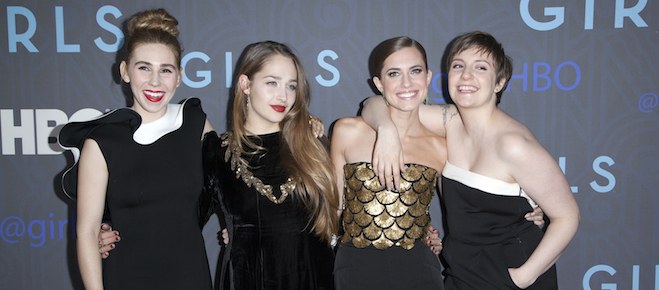Girls, Season 2: What’s the worst that could actually happen to these people?
Colin Horgan on a new season of a show about the nothingness of 20-something existence
(From L to R) Actresses Zosia Mamet, Jemima Kirke, Allison Williams and Lena Dunham attend the Season 2 premiere of the television series “Girls” in New York January 9, 2013. REUTERS/Andrew Kelly (UNITED STATES – Tags: ENTERTAINMENT)
Share

There is a problem with marriages on television, and as I finally, belatedly, sat down to watch the Season 1 finale of Girls, Elaine Blair’s words on that matter were ringing in my ears. The thing about sitcoms, as opposed to cinematic love stories, she wrote earlier this month, is that romantic films “traditionally end at the moment the obstacles are overcome and love is declared.” Sitcoms, on the other hand are tougher territory for relationships, and “script writers, used to working in a mode of farce, struggle to find the right tone for domestic satisfaction.” Perhaps because of that and, as Blair notes, the fact writers and the cast are usually unsure of how long the series will go on and are under pressure to keep things fresh, sitcoms might actually share more with real life. You’re forced to get into things without really knowing where they’re going to end up.
We last left the Girls foursome and their various hangers-on at the bottom of the impact crater of an unexpected summer wedding. After spending much of the previous nine episodes announcing both her bohemian lifestyle in various physical and verbal ways, and–on a specific and particularly expensive (and not at all wine-proof) rug–her derision for anything that seemed too of-the-system, Jessa got married. To that rug-owning, of-the-system guy, no less. The move seemed a weird one, not so much for Jessa, but for the show. The wedding seemed like an abrupt shift in tone. It suddenly felt like a season finale, rather than continuing the strong sense of authenticity or verisimilitude that carried Season 1 to that point. Before the wedding that feeling of the aimlessness of real life Blair hinted at was explored, more or less, honestly.
I wondered then if I should be worried about Girls.
Judging by the trailer for Season 2 (below), which kicks off this Sunday at 9 p.m. ET on HBO, things may be sufficiently hipster-existentialist for a return to form, or at least to hold up Hannah’s (writer, director Lena Dunham) winking self-proclamation as the potential “voice of a generation.” Which is to say, we’ll get right back into the nothingness of the 20-something existence of a handful of white Brooklynites, but this time with a new gay ex-boyfriend roommate in Hannah’s semi-post-Adam, post-Marnie world. Not to mention dealing with freshly honeymooned Jessa.
http://www.youtube.com/watch?v=9FPkC9In57I&feature=youtu.be
A lot of negative ink was spilled last year over Dunham’s writing of her alter-ego, Hannah, and all her friends’ fretting over the finer points of a comfortable middle-class existence. And, fairly, there is a question of what’s at stake. What’s the worst that could actually happen to these people? Reading the synopses of the upcoming season hardly screams high drama: “Jessa revels in married life.” “Marnie gets bad news at work and a visit from her mom.” “Shoshanna avoids Ray at the party.” “Hannah gets unsolicited musical attention from heartbroken Adam.” It’s not the stuff of Breaking Bad or Mad Men, to be sure. The hopes, annoyances, peculiarities, and memes of an entire generation combined ought to be weighty stuff. Is Girls really doing any heavy lifting?
Well, yes and no. Dunham knows the voice-of-a-generation gag, and happily delivers it. She seems to know its meaninglessness as well as she knows an unexpected, late-night roommate dance party. It’s just a tagline–one that could, and maybe should, appear in quotes below the byline on any written document composed in the past decade by anyone under 30. It’s knowing post-postmodern code for a generation quietly accepting of its honestly held and modest aspirations, but smarmily faking the big dreams of an everyone-wins-a-participant-medal childhood.
Still, we all want something out of this life, even if, for some of us, it is just middle class and white, or boring and aimless. So why not talk about that? Probably, that’s called entitlement and selfishness, the alleged hallmarks of the post-1980s babies. But for a lot of people, it’s just life. Maybe it’s not so bad if this is all the generational weight Girls carries–that is, just some insta-retro, anti-nothing, impatient and sarcastic late capitalism, awash in resigned, collective self-doubt and directionless internships. Is that so bad? If nothing else, unlike the women of, say, Mad Men’s Sterling Cooper Draper Price, at least the load these Girls shoulder is a light-ish one.
Back to that season finale. Blair rightly notes that we know weddings don’t usually come at the end of adulthood, but rather at the beginning. And “the grown-up questions we ask ourselves when deciding whether to stay or go, to marry or not, don’t hinge quite as much on the idea of a right or wrong choice as on a rough sense of timing: when, if ever, is the right time to write the marriage into our lives?” she asks. Lord only knows. But maybe this is actually part of the brilliance of Girls: we can relax and remember that, sometimes, you just have a wedding. And sometimes, after that, you need to wander around on a beach and eat some cake. See what happens.